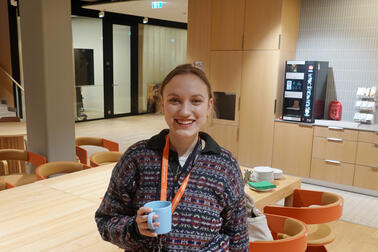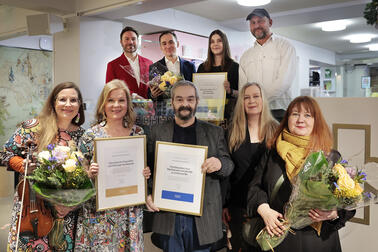
At Itäkeskus Service Home, residents Aino Hartikainen and Reino Turtiainen can’t help but smile when practical nurse Marina Sail and care assistant Jenelyn Malana take them outside to the sunny yard.
Sail and Malana share a great rapport and are familiar with each other’s work methods. It’s no surprise, as Sail has been mentoring Malana since April. However, her mentoring responsibilities have temporarily ended since Malana completed her care assistant’s training in late May.
Malana arrived in Helsinki as part of a group of 24 nurses from the Philippines in the spring. She traveled via Hong Kong, where she worked as a housekeeper. Having already completed some care sector studies in her home country, she continued her education in Finland through an apprenticeship.
“I could immediately tell that Jenelyn had prior experience in this field,” Sail says.
She adds that despite the adjustments she had to make to her own work and the report writing involved, her role as a mentor has been enjoyable.

Continued direct recruitment
“The group of 24 from the Philippines represents the City’s first direct recruitment from abroad,” says Maritta Haavisto, Director of Senior Centres.
Upon their arrival, the group of care assistant students began their studies through an apprenticeship at ten of the City’s senior centres.
In November, Helsinki will welcome another 15 new care assistants who, like their April counterparts, will have the opportunity to pursue practical nursing studies after obtaining their care assistant qualification.
Malana has already made the decision to continue her studies, potentially aiming for a nurse’s qualification.
Before coming to Finland, care assistants undergo approximately six months of Finnish language and care work theory studies.
The work communities have been amazed at how well their new colleagues have learned Finnish. While English-speaking instructors have been available on-site as a backup, the goal is for everyone to primarily use their shared work language - Finnish - right from the beginning.
Malana’s colleagues, Sail, Head Nurse Essi Holopainen, Practical Nurse Ammar Elsayed, and Physiotherapist Teemu Jylhä, seldom need to resort to English.
Elsayed himself understands the experience of studying in a foreign country and in a foreign language, allowing him to relate to the newcomers and support them accordingly.
Elsayed is impressed with how quickly the arrivals have progressed. They are already making daily entries into the client information system and effectively communicating with their colleagues in Finnish. Their motivation to learn is remarkable, and many carry a pen and notepad in their pockets at work for taking notes.
The work community has also observed the newcomers’ initiative and ability to engage with the senior residents.
“Sometimes I have to tell her to sit down and take a break,” Sail says, eliciting laughter from Malana by her side.
The City also anticipates the arrival of 50 nurses from the Philippines in the autumn through direct recruitment. The plan is for them to begin working in their own profession after learning Finnish and obtaining the necessary qualifications, which is estimated to take approximately one year.
Friendly and kind Finns
Malana shares that she diligently researched Finland before her arrival, spending time googling information about the country. She was particularly captivated by the breathtaking photos of Finnish nature and delighted to learn about the calm demeanour of the Finnish people.
“There is so much space here, and it’s not as crowded as Hong Kong,” she says, expressing her preference for the more tranquil environment.
To her surprise, Malana found the Finnish people to be incredibly friendly and kind. Everyone has been willing to lend a helping hand and offer support. Even the seniors at the service home are understanding when she occasionally struggles with her Finnish vocabulary.
Malana has become well-acquainted with the 31 seniors at her group home, understanding their unique needs and preferences.
Compared to her previous job in Hong Kong, she now enjoys ample leisure time. Previously, her workdays were 12 hours long with only one day off per week. In Finland, she relishes the abundance of free time, further enhanced by short and walkable work commutes. Living with two other care assistants from the Philippines, she cherishes their friendship and the positive dynamics within the group.
During her leisure time, Malana takes pleasure in running and appreciates the well-designed exercise routes in Itäkeskus.

A soft landing for arrivals
Haavisto highlights that it’s not just Malana’s colleagues who have praised the new workers; the newcomers themselves express their rapid adaptation and settlement in their new country.
Helsinki is not the only city facing a significant shortage of labor in the care sector, and there is fierce global competition for talent.
Helsinki’s key principle regarding direct recruitment is ethicality: individuals are recruited based on their education and competence for roles that align with their skills. The employer takes responsibility for language training and on-the-job learning, prioritising patient safety.
Finland’s advantage in the international competition is its commitment to fair working conditions. Before deciding to seek work in Finland, the arrivals from the Philippines had also heard about Finns being considered the world’s happiest nation.
Efforts are made to ensure the newcomers have a smooth start in Helsinki. They receive assistance with paperwork and are provided with accommodation near their workplace.
“As a major employer, Helsinki is well-positioned to attract talent,” says Haavisto.
The City also aims to support family reunifications, assisting immigrants in establishing roots in the country.
The staff at Itäkeskus Service Home firmly believes that fostering a pleasant work environment contributes to the overall enjoyment of living in Finland. They recognise that the atmosphere of the workplace plays a significant role in this regard.
A multicultural work community
Claudia Hellström, the Director of Itäkeskus Service Home, emphasises that the staff at the home was already multicultural even before the new arrivals joined. In this diverse work community, the background of one’s colleagues holds no significance. What truly matters is their motivation, positive attitude, and willingness to learn.
Hellström commends not only the newcomers but also the work community for their support. Prior to their arrival, the staff collaborated to ensure the best possible support for their new colleagues. The arrivals were warmly welcomed with open minds.
The team strongly believes that the greatest satisfaction in their job comes from achieving success together. Malana shares a recent enjoyable experience of going on a delightful trip to Korkeasaari with her colleagues and five residents. The outing brought her happiness and joy.


